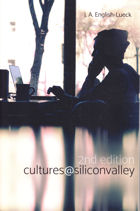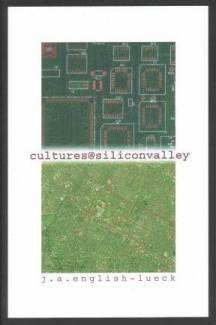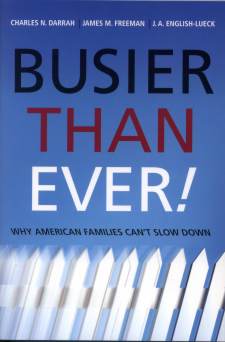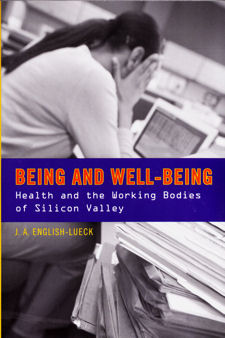Silicon Valley Cultures Project
| PUBLICATIONS | PAPERS | LINKS | CONTACT US | SITE MAP |
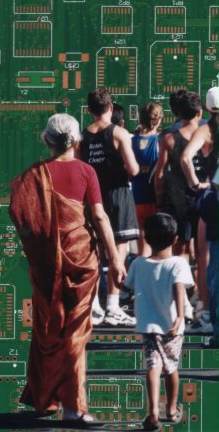
Composite photo courtesy of .
Joe Hertzback and Karl Lueck.
A long-term ethnographic study of the people and communities whose lives are connected to Silicon Valley. |
Beginning in 1991, Drs. Charles Darrah and J. A. English-Lueck, professors at San José State University, California, developed a research project to understand life in the Silicon Valley region. Later James M. Freeman, a scholar of India and Vietnamese America joined the team. The project has been an umbrella embracing research efforts, great and small, done by the principal scholars in collaboration with various academic, community and organizational partners. The Silicon Valley region is a laboratory for research into high technology communities due to its robust and varied industrial base, the use of information technologies, organizational innovations, and its broad cultural diversity. Some of the inhabitants are in high-technology industries, others are less obviously connected. All can be the source of understanding as this region continues to illustrate the subtle workings of globalization in the post-industrial age. In the years since its inception, this website has reflected the ebb and flow of data collection and dissemination. In the early years, 1991-1998, the basic framework of research was refined. Four research questions were developed including: What does it mean to live and work in Silicon Valley to various stakeholders? What is the impact of living with global flows and cultural diversity? How do work organizations influence individuals, families and communities? What happens when technology permeates everyday life? Student-faculty collaborations produced the foundation for the project. Community partners, such as the Institute for the Future, Alliance Innovation Lab Silicon Valley, Joint Venture Silicon Valley Network,The Tech Museum of Innovation, Ericsson and Daimler Chrysler, found they had common cause with the scholarly teams The centrality of work, and the interaction of work and family were the topics that dominated research in this phase of the project. From 1998-2002 the research team was funded by the National Science Foundation and the Alfred Sloan Foundation to pursue two large scale projects, one studying work, identity and community in Silicon Valley and the other examining the nuances of dual career families in the region. Afterward, the research team produced three books, the first is Cultures@SiliconValley, then Busier than Ever! Why American Families Can't Slow Down and the latest book is Being and Well-being: Health and the Working Bodies of Silicon Valley. Cultures@SiliconValley was updated and published in a second edition in 2017. After 2002, the research team focused on three new directions. First, the project has globalized, examining other regions that connect to Silicon Valley. Second, just as the work/family interaction emerged in the prior round of research, health concerns in the workplace and community have jumped out as issues in this first decade of the 21st century. Finally, the creation of San Jose State University's Master's in Applied Anthropology has reaffirmed the importance of community connections in ongoing research. New partners, such as The Health Trust, and Communivercity work with student and faculty researchers and practitioners in the department. English-Lueck remains an active researcher in Silicon Valley cultures. Use this site as an ongoing archive and portal It will contain working papers, links to research partners and projects, and related Silicon Valley research. As always, the very divergent nature of the project is its greatest asset. Many activities are going on in the Anthropology Department at San Jose State University. Some of the work is on Silicon Valley, and other projects relate to diverse subjects that happen to be in Silicon Valley. Mine it as you need. Potential collaborators, research associates, partners for our graduate students in applied anthropology and friends of the project can contact us to explore further possibilities. A Thanks to Participants Although individual participants may not be named (honoring the rights of Human Subjects, protecting informant anonymity) the Principal Investigators would like to express their thanks to all the people who allowed them (and their students) access to their lives, families, and personal information. A special thanks to the families of the Work and Family in Silicon Valley project for allowing the Principal Investigators to encroach upon their lives for so many hundreds of hours. Thanks are also extended to all the companies, institutes, schools, and officials who allowed access to their facilities during the course of this research. Finally, thanks are due to all of the
student researchers who made observations, gathered critical incidents
and conducted interviews in Anthropology courses over the last sixteen years,
including: ANTH 102
- Silicon Valley Connections |
|||||||||

